Donald Trump’s new tone on immigrant kids divides GOP
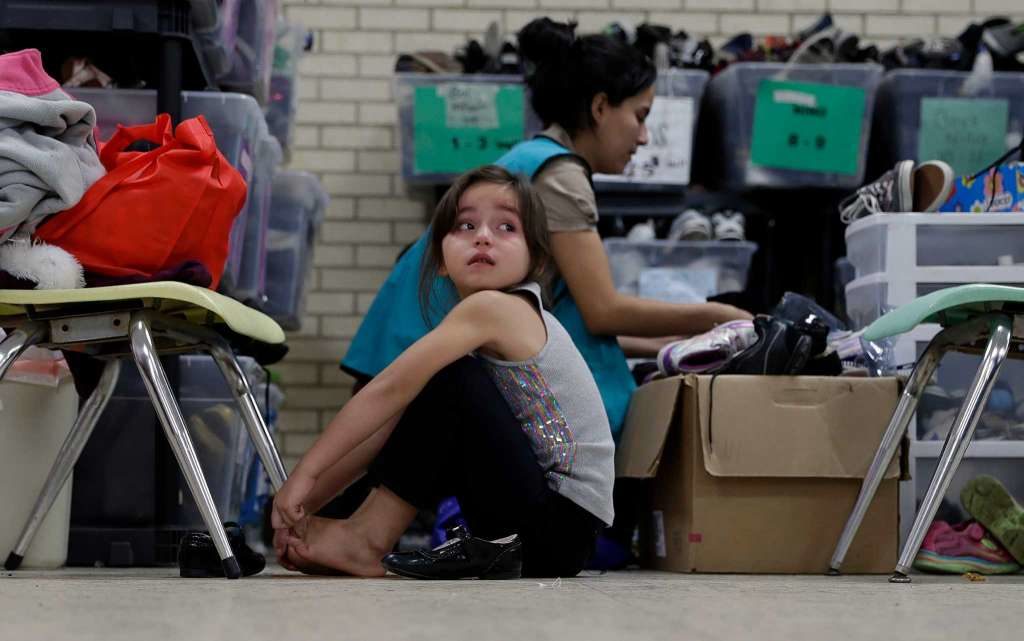
Donald Trump‘s promise to “work something out” for immigrants brought here illegally as kids is dividing fellow Republicans, underscoring how difficult it will be for Congress to take any action on immigration, whether it’s building a wall or dealing with immigrant youths. Complicating matters, the president-elect’s advisers worked to walk back his comments almost as soon as they were published, with one transition aide demanding anonymity to deny that Trump intended to set any new policy. Trump’s remarks about the young immigrants, known to their supporters as “Dreamers,” came in a Time magazine interview in connection with his designation as “Person of the Year.” During the campaign Trump pledged to “immediately terminate” President Barack Obama‘s executive actions on immigration, including the 2012 Deferred Action for Childhood Arrivals, known as DACA, which has extended work permits and temporary deportation relief to more than 700,000 immigrants brought illegally to this country as youths. But in the interview published Wednesday he adopted a far more sympathetic tone. “We’re going to work something out that’s going to make people happy and proud,” Trump said. “They got brought here at a very young age, they’ve worked here, they’ve gone to school here. Some were good students. Some have wonderful jobs. And they’re in never-never land because they don’t know what’s going to happen.” Trump did not offer details, and Time said that he did not back off his pledge to undo Obama’s executive actions. But Republicans who’ve supported congressional action to help immigrant youths welcomed Trump’s new tone. “I can tell you I’m very relieved at his comments today and I think folks back home in my district and across the country are going to be very relieved as well,” said Rep. Mike Coffman, R-Colo. “Obviously Dreamers is one part of the equation, I clearly hope we do more. But I think that’s got to be the top priority to do.” Trump’s comments were also welcomed by some Democrats. Senate Democratic leader Harry Reid of Nevada cited them in an interview Thursday on NPR as evidence that Trump is “not as bad as I thought he would be.” For immigration hard-liners, on the other hand, Trump’s comments set off alarm bells. “We have an obligation to restore the rule of law and you can’t do that while you’re rewarding people who break it,” said Rep. Steve King, R-Iowa. “It’s the principle of the rule of law that’s at stake and I’m hopeful that prudent heads will prevail.” Because immigrants must reapply for DACA and work permits every two years, even if he doesn’t proactively undo DACA Trump could effectively cancel out the program over time by taking no action to renew it. But a transition aide, demanding anonymity because he was not authorized to speak on the record, downplayed Trump’s comments and said his original promise to roll back Obama’s executive actions stood. Obama announced the DACA program after Congress failed to pass legislation giving a path to legal status for Dreamers. Subsequently, a comprehensive, bipartisan bill passed the Senate in 2013, but it stalled in the GOP-controlled House. Obama ultimately took another, broader, executive action, aimed mostly at protecting adult immigrants with U.S. citizen children, but that one got blocked in court. Lawmakers’ repeated failures during the Obama administration to come together on immigration overhaul legislation leaves it uncertain whether Congress will be able to pass anything at all on the divisive topic with Trump in the White House, despite his tough campaign rhetoric about building a border wall and ousting criminal immigrants. Trump could take some steps on his own, but would need Congress for major policy changes, including any permanent protections for Dreamers. Sens. Lindsey Graham, R-S.C., and Dick Durbin, D-Ill., planned to introduce a bill Thursday to address status for Dreamers. House Republicans want to pass a border security bill to make good on Trump’s repeated campaign promises to build a wall on the 2,000-mile U.S.-Mexico border, but key lawmakers and Trump himself have already suggested that it could end up including fencing or a “virtual” wall that falls short of the big wall Trump promised Mexico would pay for. And even if a border security bill does pass the House, Senate Democrats are likely to balk at passing it without also taking steps to offer legal status to the 11 million immigrants living in this country illegally, something that House Republicans could reject in turn. The opposing views suggest that, despite the prominence of immigration as an issue in the presidential campaign, inaction may be the likeliest end result on Capitol Hill. Republished with permission of The Associated Press.
Steven Kurlander: Real grassroots transition required: Rebuilding the GOP
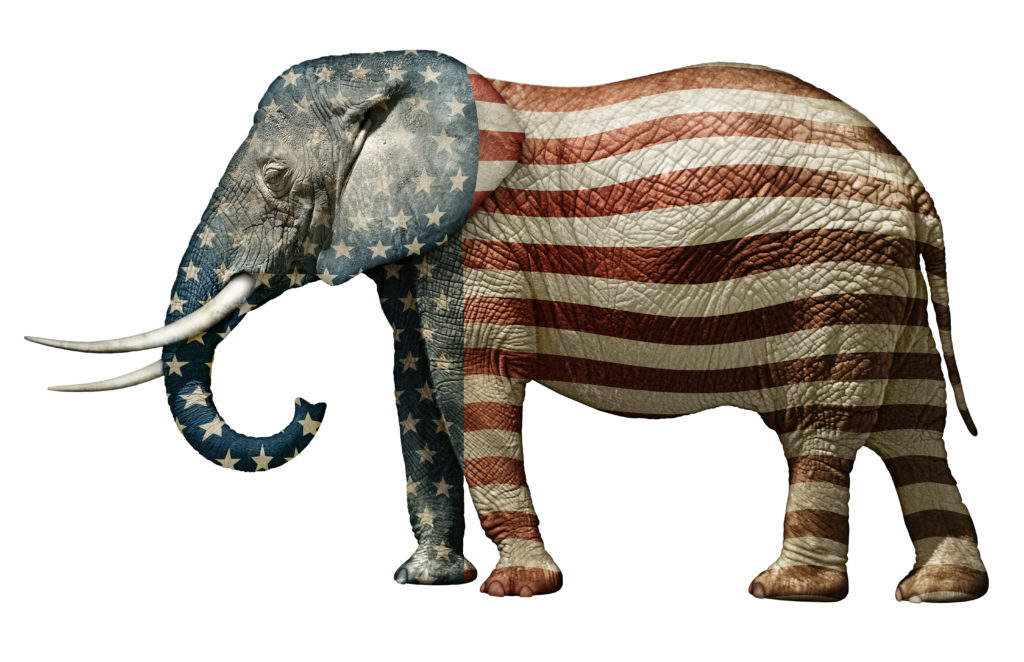
Steven Kurlander: Real grassroots transition required: Rebuilding the GOP So far, if you were to sum up the Donald Trump team transition, it’s pretty disappointing in terms of delivering important changes in how Washington works that the president-elect promised during the campaign. For the most part, the present transition period is dominated by insiders from the Grand OLD Party, threatening the promise of a freethinking Trump White House and the promised change that America yearns for. Trump’s victory was rooted in a hope for true change in not only in the way Washington governs, but also in terms of changing the political system to be more responsive and representative of the true majority of American people. That included remaking and revitalizing a stratified and lethargic Republican Party that not only did everything possible to thwart his candidacy, but has proved incapable of truly connecting with a majority of Americans nationwide. If one thing is certainly obvious, it’s that President-elect Donald Trump won the 2016 presidential election by putting together a truly grassroots populist campaign that won the hearts and minds of disillusioned Americans. These voters, many of whom had never voted or stopped voting, came to the polls to vote for Trump, or against Hillary. What defined this Trump swing group? These were the voters that both the Democratic and Republican parties had forsaken or taken for granted over the last two decades. Trump and his loyal, core staff ran a brilliant guerilla-style campaign, using unorthodox messaging and strategies that reached a 21st-century silent majority. Nowhere was this more true than in the make-or-break battleground of Florida. There, they fought with limited financial resources a victorious three front war against both the Democrats and Republican parties as well as the mainstream press, too. In fact, Florida was ground zero in that regard for Trump, whose team lead by seasoned political operative Karen Giorno and self-funded by the candidate not only knocked out former Florida Governor Jeb Bush before March 15, but leveled Senator Marco Rubio in his home state primary by winning 66 of 67 counties in the GOP primary. The agile, lean and mean Florida methodology crafted by Giorno became the populist Trump blueprint for victory in November as she was elevated to national coalitions and grassroots operatives, as well as the Director of Women’s Engagement and took the show on the road to North Carolina and Pennsylvania. It worked, carrying these states for Trump on Nov. 8 and gaining unheard of percentages in Democratic strongholds like Palm Beach County. “Karen Giorno understood how to win Florida for Mr. Trump and she did just that. Then she took that playbook to the other battlegrounds states. She’s a winner,” said former Hialeah Mayor Julio Martinez, who strongly supported Trump. But after such a brilliant victories in Florida and other states like Ohio, Pennsylvania and Michigan, the fear of the new Trump coalition has the GOP striking back — and leaving Trump loyalists like Giorno scratching their heads wondering how the RNC is taking credit for a victory they had very little if nothing to do with. Instead, the GOP that Trump conquered is now getting an undeserved second lease on life. They are also now rewriting the election narrative to claim sole credit for his win, especially in Florida. More troubling? you don’t hear anything at all about making changes to the Republican Party. In order for the GOP to survive, the achievement by Trump’s campaign of fusing the GOP faithful with independents and disenfranchised Democrats must be taken further to move the nation forward with a durable coalition. In addition to delivering on his campaign promises on trade, immigration and job creation, Trump also must “shake up” the present GOP party apparatus by bringing his original campaign and populist political philosophy into a new, rebuilt populist Republican Party. More importantly, unless Trump remakes a “Grand New Party” as his own brand of new American political reality, and includes members of his original “Trump” team from the campaign, he will quickly lose the goodwill of those that elected him to office. What looks right now like a “Bush-league” GOP domination of a Trump Administration certainly won’t result in making American Great Again, much less than ensuring a doomed presidency from the start. ___ Steven Kurlander blogs at Kurly’s Kommentary and writes for FloridaPolitics.com. He is an attorney and communications specialist living in Monticello, New York. He can be reached at kurlyskommentary@gmail.com.
GOP governors gather amid push for ‘disruptive change’
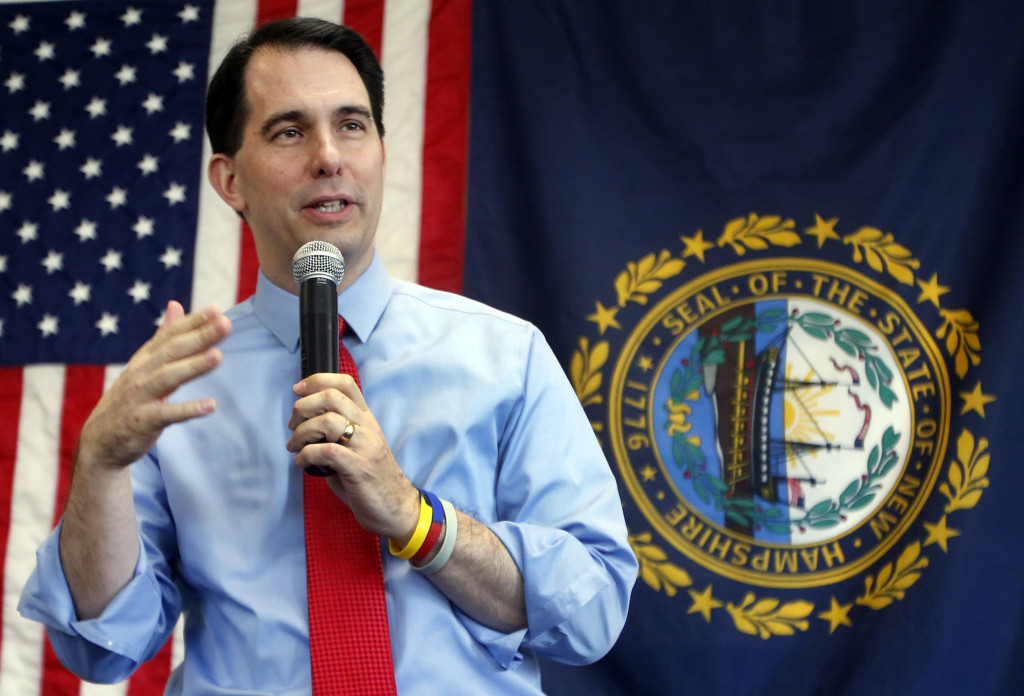
The nation’s Republican governors are meeting in battleground Florida with an unexpected opportunity: a president-elect of their own party with political IOUs to pay, perhaps the projects the party’s heads of the states prefer. Donald Trump owes no governor more than Wisconsin’s Scott Walker, the onetime rival for the GOP presidential nomination who ended up endorsing the billionaire and whose state had been thought to be a Democratic firewall. But for the first time since 1984, Wisconsin voted for a Republican last week. When Trump won that state and Pennsylvania, The Associated Press around 2:30 a.m. EST declared him the winner of the presidential race over Hillary Clinton. Walker, the incoming chairman of the Republican Governor’s Association, said Tuesday that Trump’s election elevates “the possibilities in terms of what we can do to take power out of Washington and send it back to the states.” More importantly, he said on MSNBC, “back to the people.” What the people can agree on as a top post-election priority is fixing the nation’s roads, bridges and other infrastructure, according to a survey at the end of the election. Clinton and Trump voters polled on 13 issues after the election agreed on two problem areas – drug addiction and crumbling infrastructure in the United States, according to the Pew Research Center. Walker said the federal government’s focus should be on “fixing and maintaining our existing infrastructure” not “grandiose” high speed rail lines, for example. During a speech at a Monday night reception at an Orlando hotel, Florida Gov. Rick Scott called on his fellow Republicans to help Trump bring “disruptive change” to Washington. For Scott, that means a complete repeal of President Barack Obama’s health care overhaul. Scott, who has been vague about what should be done about the 20 million Americans who got health insurance through the overhaul, said “of course we will need to unwind in a fair way, but we absolutely must repeal it.” Those expected to attend this week’s conference include governors who had voiced differing opinions over Trump’s bid for the White House. Scott backed Trump right after he won the Florida primary in March and eventually headed up a Super PAC that ran ads praising Trump and criticizing Clinton. New Mexico Gov. Susana Martinez, the nation’s only Latina governor, refused to endorse Trump before the election but did congratulate him after he won. Republished with permission of the Associated Press.
Donald Trump tells backers to ‘watch the polls’ — but signups slow
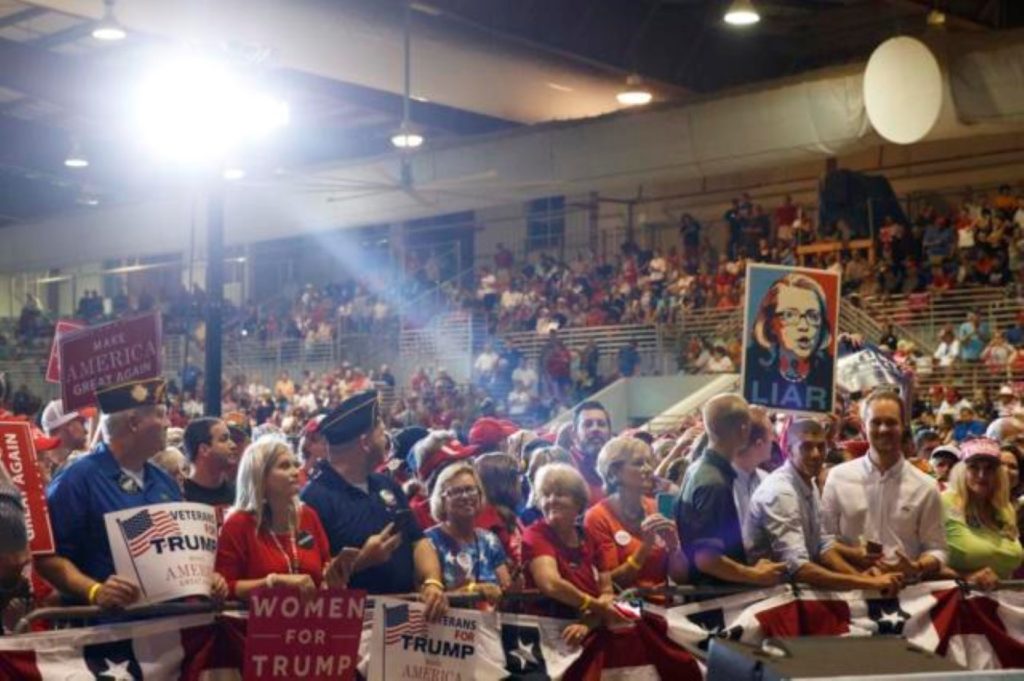
Donald Trump regularly warns his crowds to closely watch polling places to prevent Democrats from stealing the election. But his campaign has failed to enlist many to serve as official poll watchers in major population centers, according to spot checks by The Associated Press. In some key regions, Democratic monitors will far outnumber Republicans on Election Day. The Trump team seeks volunteers on his website to “Help Me Stop Crooked Hillary From Rigging This Election.” But it’s unclear what the campaign does with its list — voters in Arizona and Virginia who signed up were never contacted. While specific rules vary from state to state, poll watchers generally are registered voters appointed by the campaigns to sit in polling places and observe. They can point out potential problems to election officials and, in some states, challenge whether a voter is actually eligible. But they cannot campaign for their candidates or confront voters themselves. In many of the largest cities in battleground states, Democratic poll watchers are set to substantially outnumber Republicans. Even in Philadelphia, a place Trump has singled out as being at high risk of vote fraud, there has been no surge in Trump poll watchers. The city had a total of 4,200 signups as of last week — only about 480 of them from the city’s 119,000 Republicans. “I’m handling everything, and I would say this is about average,” said Joseph DeFelice, the head of Philadelphia’s Republican Party. DeFelice said he is concerned about how Republicans are treated on Election Day in some overwhelmingly Democratic neighborhoods, but said he isn’t worried by the absence of more observers. When roughly 1,500 Republican poll watchers volunteered for the 2004 election, “that was way too many,” he said. “The Democrats will have three to four times the number of poll watchers that we do.” It’s not clear why there is a discrepancy between Trump’s rhetoric urging poll watchers and the lack of signups: whether it was a failure by the campaign to organize or if it was never truly a true campaign priority. The Trump campaign did not respond to requests by The Associated Press by phone and email to discuss the issue. In Pennsylvania and some other battleground states, poll watchers can still be registered. But in hotly contested Florida, it’s already too late: the registration period ended Oct. 25. In Miami-Dade County — containing 999 precincts and more than 10 percent of Florida’s voters — Trump’s campaign has registered only 150 poll watchers, compared to the Clinton campaign’s 903. The local Republican Party registered 88 more — but even including those, Democratic poll watchers in Miami-Dade will outnumber Republicans nearly four to one. In other counties, Trump’s poll watchers are more evenly matched or even outnumber Clinton’s. But after surveying election officials in Florida’s 10 most populous counties, the AP found that Clinton’s people far outnumber Trump’s. Local Republican committees helped narrow the gap but did not close it. Trends are difficult to interpret among Florida counties that provide historical data. In Duval County, which Mitt Romney carried with 51 percent, Romney’s 277 election observers in 2012 have shrunk to just 60 for Trump. In Orange County, which Obama won with 59 percent of the vote, 20 poll watchers registered for Mitt Romney in 2012 have exploded into 294 for Trump. Carolyn Bourland, a retired teacher in Orlando, said Trump’s campaign encouraged her to become seriously involved in an election for the first time of her life. “It’s like being an investigator. You have your eyes and ears,” she said. She said she was worried about genuine attempts to rig the election. “It’s shocking how much of this stuff is going on,” she said. But she said she was clear on the limitations of her role. “You’re not allowed to campaign for any candidate, and if you see something suspicious, you go to the person in charge,” she said. In some of Ohio’s biggest population centers, Republicans have preserved their options to send in election observers. In both Cuyahoga and Franklin counties, which Obama won with 69 percent and 60 percent, respectively, local Republican officials have submitted tentative paperwork to have a poll watcher in each of the counties’ roughly 825 precincts. But Franklin County GOP Central Committee Chairman Brad Sinnott said he expected few, if any, of those slots would be filled. “That would be pointless,” said Sinnott, who also sits on the Franklin County Board of Elections. Under Ohio’s bipartisan election administration system, Republicans and Democrats both share oversight of elections, rendering serious concern about improprieties moot, he said. At the Trump campaign’s request, Sinnott said the local party has reserved spots for observers. If people want to fill them, actual election workers will provide them with a chair, if available, and “normal human courtesy,” Sinnott said. But Sinnott doesn’t expect either Democrats or Republicans to turn out in force for election monitoring. They’ll have better things to do Nov. 8. “Our local parties will be trying to influence election behavior,” he said. “Not watching others vote.” Republished with permission of The Associated Press.
As Donald Trump falters, more Republicans say they’ll block Hillary Clinton
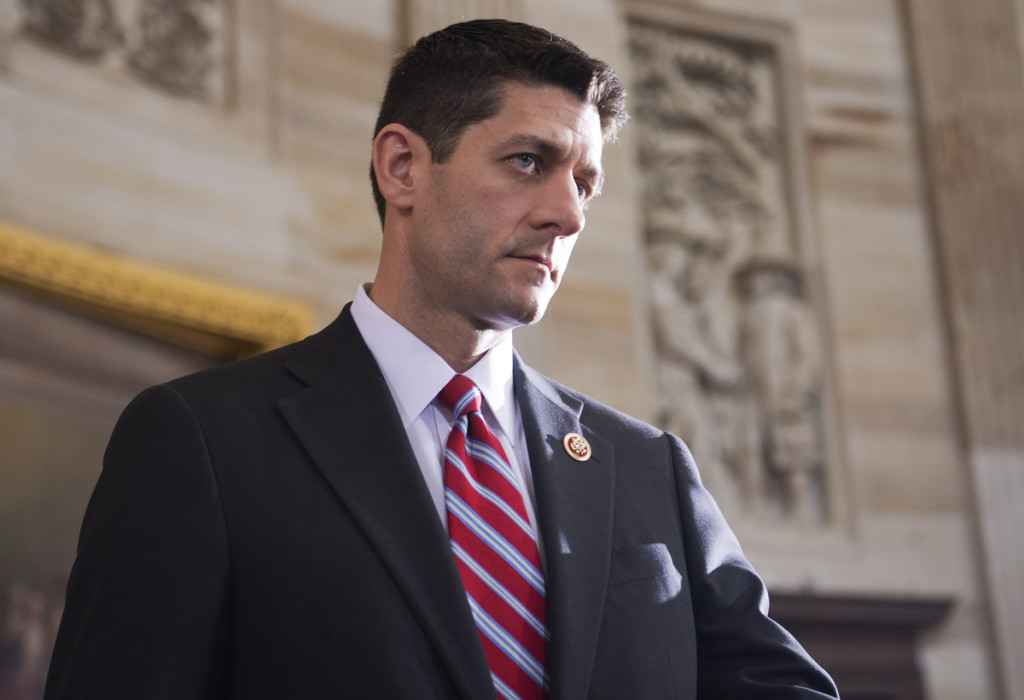
A new fundraising email from House Speaker Paul Ryan‘s political operation, over former Speaker Newt Gingrich‘s signature, seeks money for Republican congressional candidates by calling the appeal “our very last chance to stop Pelosi and Hillary.” Indiana Republican Trey Hollingsworth says in one TV ad that he’s running for Congress to stop three Democrats – opponent Shelli Yoder, presidential candidate Hillary Clinton and House Speaker Nancy Pelosi – from imposing “higher taxes and government-run health care.” In another spot, the GOP-aligned Senate Leadership Fund attacks the Democratic Senate challenger in Missouri by saying, “It’s surprising how many ways Jason Kander is just like Hillary Clinton.” With polls showing Republican presidential candidate Donald Trump facing a steep path to victory, GOP candidates are increasingly seeking voters’ support by saying they will check Clinton’s agenda. Republicans hope that a loathing for Clinton will drive voters to the polls who otherwise might stay home because of their aversion to Trump. Yet the value of the check-and-balance tactic is questioned by both parties’ strategists as voters express fatigue with gridlock and a desire that Washington address problems like the slow-growing economy. Democrats deride Republicans’ use of the approach as ineffective and blatantly disloyal to their own nominee, and even Republicans are torn over its usefulness this late in the campaign. “The tightrope you walk is that assuming a Hillary win can potentially depress your base” voters’ turnout, said GOP pollster Jon McHenry. But he said with Clinton’s favorability ratings nearly as low as Trump’s, arguing you will prevent Clinton from getting “free rein” in Washington is “a potent argument for a lot of independents.” The tactic is popping up in spots around the country, among them: A new ad by the American Action Network, which backs House Republicans, morphs a picture of Michigan Democratic House candidate Lon Johnson into Clinton and says both have “taken a fortune from special interests.” Another by the network that starts Wednesday calls Suzanna Shkreli, a Democratic candidate in a second Michigan district, “a rubberstamp for Washington insiders” as pictures are shown of Clinton and Pelosi. In central California, the Congressional Leadership Fund supports GOP Rep. Jeff Denham by saying Democratic challenger Michael Eggman and Clinton back the dangerous nuclear arms pact with Iran, though “California families know they’re wrong.” The National Republican Congressional Committee, the House GOP campaign organization, says Democratic candidate Emily Cain “sides with Hillary, not with us” as she tries unseating freshman Republican Rep. Bruce Poliquin. An NRCC spot says first-term Rep. Brad Ashford, D-Neb., “says he’s with us, but Clinton and Pelosi know he’s with them.” And west Texas GOP Rep. Will Hurd has an ad calling himself “the only candidate willing to stand up to Hillary Clinton and Donald Trump.” The reliance on the tactic comes with Republicans worried that a poor Trump showing could help Democrats capture a Senate majority and erode GOP House control. The email from Ryan’s political organization seeks contributions “to ensure the last line of defense for conservative values doesn’t fall into the clutches of Hillary.” After months of clashes, Ryan has refused to campaign for Trump and the presidential candidate has savaged the speaker on Twitter. Asked why Ryan was adopting the check-and-balance approach, spokesman Zack Roday said Ryan “is focused on beating Democrats, including Hillary Clinton, on Election Day” and “committed to preserving our congressional majorities.” GOP pollster Robert Blizzard said the tactic works best if tied to issues Republican voters find emotional, like boosting taxes or expanding President Barack Obama’s health care law. But he cautioned, “The easiest, most efficient, most effective way to defeat a Democratic candidate is to make that Democratic candidate unacceptable, unelectable.” Democrats say the tactic is flawed because it relies on two unlikely occurrences: Republicans repelled by Trump showing up to vote anyway, or people splitting their ticket between Clinton and a GOP congressional candidate. “The national tide is running very strongly against down-ballot Republicans,” said Democratic pollster Geoffrey Garin. “They have to try to do something to change the national narrative of the election, even if it means throwing their nominee right under the bus.” Democrats have been returning the favor big time, with President Barack Obama taking to the campaign trail to link GOP congressional candidates to Trump. House Democrats’ Democratic Congressional Campaign Committee and other groups are running ads in numerous races making that same point. Republished with permission of the Associated Press.
Paul Ryan’s break from Donald Trump prompts talk of GOP rebellion
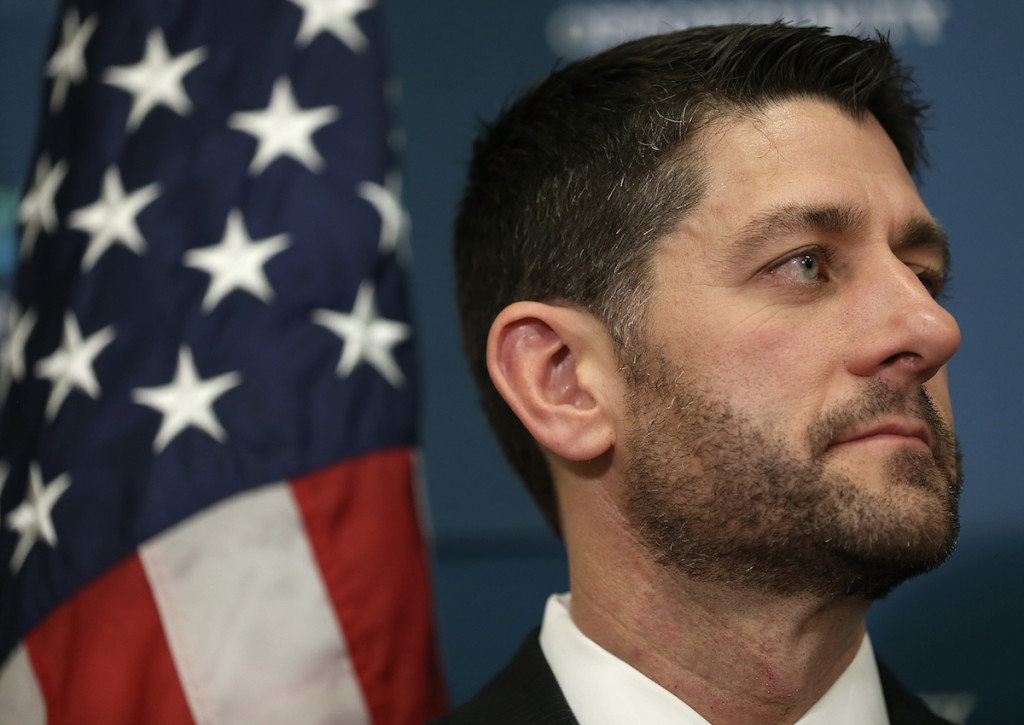
House Speaker Paul Ryan‘s abandonment of Donald Trump is aimed at protecting Republican control of the House. But it may test his hold on his own job, and his long-term ambitions. Ryan’s announcement that he won’t defend his party’s presidential nominee and that GOP candidates should choose their own paths to victory – with or without Trump – has led some Republicans to suggest they may not back Ryan’s re-election as speaker. “Given the stakes of this election, if Paul Ryan isn’t for Trump, then I’m not for Paul Ryan,” Rep. Jim Bridenstine, R-Okla., said Wednesday on Twitter. Assuming Republicans remain in control of the House after November’s elections – which no longer seems assured – Ryan may need every GOP vote he can get to keep his post. That means Ryan, R-Wis., cannot afford to let this week’s trickle of defiant Republican lawmakers grow much larger. Ryan, 46, was the 2012 vice presidential nominee and many think he could run for president in 2020, or beyond. Losing an election for speaker could be a blow to any loftier political ambitions. Ryan’s tactic has cheered many GOP lawmakers nervous that Trump’s flagging candidacy could cost them their jobs. But it has infuriated other Republicans and conservatives, in and out of Congress, especially Trump’s die-hard backers. They consider Ryan’s decision a betrayal that will weaken Trump’s chances of beating Democratic Hillary Clinton. “I suspect whatever he said would be a no-win for unanimity” among Republicans, former Rep. Tom Reynolds, R-N.Y., said Wednesday. “He’s walking on a tightrope, like any speaker up for re-election,” said Reynolds, who led the House GOP’s campaign organization a decade ago. On Monday, Ryan told House Republicans in a conference call that he will spend the time until the Nov. 8 election working to keep GOP control of the House, and will do nothing to help Trump. That call came after the revelation of a 2005 video showing Trump making vulgar remarks about forcing himself physically on women. Trump has since assailed Ryan, on Twitter and in public remarks. Trump said Wednesday while campaigning in Florida that Ryan and other Republicans are involved in a “sinister deal” against him. He offered no evidence for the assertion. Bridenstine is a conservative and a member of the House Freedom Caucus, which often bucks leadership. But he backed Ryan when the House elected him speaker last October. Rep. Dana Rohrabacher, R-Calif., who also supported Ryan then, hinted in an interview with The Associated Press that he might not favor keeping Ryan in the House’s top job. “I never doubted he should be speaker. However, if he can’t prevent himself from panicking and helping the enemy in a situation like this, well, then we’ll find out,” Rohrabacher said Monday. Rep. Peter King, R-N.Y., said Ryan was under pressure from Republicans in conservative districts to back Trump and from candidates from more moderate areas to distance themselves from him. “The risk he took was a plausible one, it was well intentioned. And we’re not going to know until Nov. 9 whether it’s going to work or not,” King said. AshLee Strong, Ryan’s spokeswoman, said Wednesday that Ryan is “fighting to ensure we hold a strong majority next Congress, and he is always working to earn the respect and support of his colleagues.” House Republicans meet after the November vote to select their nominee for speaker. Ryan would need 218 votes – a majority of the House’s 435 members – to become speaker when the full House votes in January. There are currently 246 House Republicans, plus a vacant seat the GOP seems likely to retain. But that number probably will shrink after Election Day, with GOP moderates among the likeliest to lose. That means a greater proportion of conservatives, some of whom are hostile to established GOP leaders, and indicates Ryan may not be able to afford losing much support. Ryan succeeded former Speaker John Boehner, R-Ohio, who retired last October after it became clear that opposition from conservatives within his party’s caucus meant he did not have the votes to retain his job. Republished with permission of the Associated Press.
Top Donald Trump aide acknowledges campaign split over backing Paul Ryan
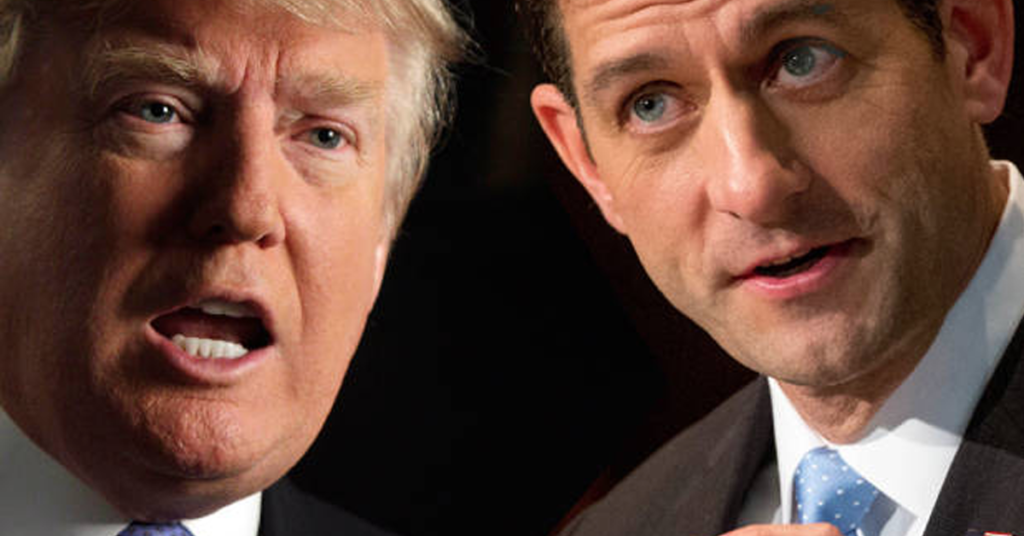
Donald Trump‘s campaign chief acknowledged Thursday the GOP presidential nominee’s team is divided over whether to endorse House Speaker Paul Ryan, but promised Trump would work with the Republican speaker if elected. “There’s a conflict within the Trump campaign,” campaign chairman Paul Manafort told ABC’s “Good Morning America.” ”We’ve sort of had a rule of not getting involved in primaries because it’s usually not a good situation for the presidential candidate. Of course, he’s going to work with Paul Ryan.” Vice presidential nominee Mike Pence split with Trump and endorsed Ryan on Wednesday. Trump’s operation has been beset by internal discord in recent days, including growing concern about general election preparedness and a lack of support from Republican leaders, according to two people familiar with the organization’s inner workings. One of the people said Trump privately blames his own staff for failing to quiet the backlash from his own party after he criticized an American Muslim family whose son, U.S. Army Capt. Humayun Khan, was killed in Iraq. The tensions come as GOP Chairman Reince Priebus and a handful of high-profile Trump allies consider whether to confront the candidate directly to encourage a new approach following a series of startling stances and statements. In the midst of the uproar over his criticism of the Khan family, Trump infuriated Priebus and other party leaders by refusing to endorse Ryan’s re-election ahead of a primary contest Tuesday. The officials, including one with direct knowledge of Priebus’ thinking, were granted anonymity to discuss internal strategy because they were not authorized to discuss the sensitive issue during one of the most tumultuous weeks of Trump’s presidential campaign. Ryan, addressing the issue for the first time this week, said it was “distressing” that Trump isn’t more focused on Democrat Hillary Clinton “and all of her deficiencies.” But the speaker also reiterated his support for Trump: “None of these things are ever blank checks – that goes with any situation in any kind of race. But right now I just think it’s important that the voters, you know, he won the delegates he won the thing fair and square.” Former New York Mayor Rudy Giuliani on Thursday dismissed reports that he was planning an “intervention” with Priebus and former House Speaker Newt Gingrich to urge Trump to abandon divisive tactics that have triggered sinking poll numbers and low morale. “I meet with Donald Trump all the time,” Giuliani told the Fox Business Network, suggesting that Gingrich used the word, “intervention,” in a recent memo. “He is a new candidate,” Giuliani said of Trump. “That adds a little bit of – more of a learning curve, that would normally be the case.” Trump on Wednesday dismissed suggestions that the GOP frustration was hurting his campaign, even as he openly contemplated an Election Day loss. “Wouldn’t that be embarrassing to lose to crooked Hillary Clinton? That would be terrible,” he said during a campaign stop in battleground Florida. He also insisted, “We’ve never been this united.” In an interview later with Florida’s WPEC-TV, Trump was asked if he was being “baited into battles.” “I think that’s probably right,” he acknowledged. “We’re going to focus more on Hillary Clinton.” The most powerful Republicans in Washington and New York’s Trump Tower concede things will not change unless Trump wants them to. “The candidate is in control of his campaign,” Manafort told Fox News Channel on Wednesday, highlighting his inability to control the nominee. “And I’m in control of doing the things that he wants me to do in the campaign.” Clinton, meanwhile, kept up her assault on Trump’s business practices, holding up a Trump-branded tie as she spoke at the Knotty Tie Company in battleground Colorado. “I really would like him to explain why he paid Chinese workers to make Trump ties,” she told employees in Denver, “instead of deciding to make those ties right here in Colorado.” Trump blamed the media – “so dishonest” – for growing criticism of his recent statements and his unwillingness to accept guidance from senior advisers. Privately, however, Trump has concerns about his own team. He was deeply upset when GOP leaders “took the other side” during his quarrel with the Khans, one person said, and blames his staff for not keeping top Republicans in line. Another person said Trump is irritated that planning in battleground states isn’t further along with less than 100 days until Election Day. Trump stunned Republicans by telling The Washington Post this week that he wasn’t ready to endorse Ryan, ahead of his primary. Ryan has backed Trump despite deep differences on policy and temperament, and has encouraged other Republicans to unite behind the party’s nominee. Trump on Wednesday reported raising $80 million in July for his campaign and the Republican Party, a significant improvement from past months. Clinton raised about $90 million over the same period. Republished with permission of the Associated Press.
In blow to GOP unity, Donald Trump refuses to back Paul Ryan, John McCain

Republican presidential nominee Donald Trump said Tuesday that he is refusing to endorse House Speaker Paul Ryan and Sen. John McCain just two weeks after pledging to bring the fractured GOP together at the party’s nominating convention. He also ripped into New Hampshire Sen. Kelly Ayotte in the same interview with the Washington Post. All three have primary challengers, and all three disapproved of Trump’s criticism of the Muslim American parents of an Army captain killed in Iraq. Trump’s refutation of Ryan, the nation’s most senior elected Republican, carried particular derision. “I’m just not there yet,” Trump said in the interview. Those are very close to the words Ryan used in the long months before he endorsed Trump, telling CNN on May 6, “I’m not there right now.” Ryan never sought Trump’s endorsement, his spokesman said. “Neither Speaker Ryan nor anyone on his team has ever asked for Donald Trump’s endorsement,” said Zack Roday, Ryan’s campaign spokesman. “And we are confident in a victory next week regardless.” The billionaire celebrity famous for retaliating when he feels insulted also refused to endorse McCain, a prisoner of war in Vietnam who Trump previously derided for having been captured. “I’ve never been there with John McCain because I’ve always felt that he should have done a much better job for the vets,” Trump told the newspaper Tuesday. “So I’ve always had a difficult time with John for that reason, because our vets are not being treated properly. They’re not being treated fairly.” As for Ayotte, who is running for a second Senate term and skipped the Republican National Convention, Trump said: “You have a Kelly Ayotte who doesn’t want to talk about Trump, but I’m beating her in the polls by a lot.” “We need loyal people in this country,” Trump added in the interview. “We need fighters in this country. We don’t need weak people.” McCain is a locked in a three-way race ahead of an August 30 primary. The primary for Ryan’s House seat is next week and Ayotte’s primary is next month. All three have said they would support Trump as the GOP presidential nominee. All three chided Trump for engaging in a flap with Khizr and Ghazala Khan, the parents of U.S. Army Capt. Humayun Khan, who was posthumously awarded a Bronze Star and Purple Heart after his death in 2004. From the podium of the Democratic National Convention, Khizr Khan criticized Trump’s position on Muslims and asked whether the real estate mogul had read the Constitution. Trump said the grieving father had “no right” to criticize him but later acknowledged their son is a hero. McCain’s response was a lengthy denunciation in which he said the GOP nomination does not confer on Trump “unfettered license to defame those who are the best among us.” Ryan condemned any criticism of Muslim-Americans who serve their country. “Captain Khan was one such brave example. His sacrifice – and that of Khizr and Ghazala Khan – should always be honored. Period,” Ryan said. Ayotte declared she was “appalled” by Trump’s spat with the Khans. Republished with permission of the Associated Press.
Republican Convention: what to watch for on Day 3
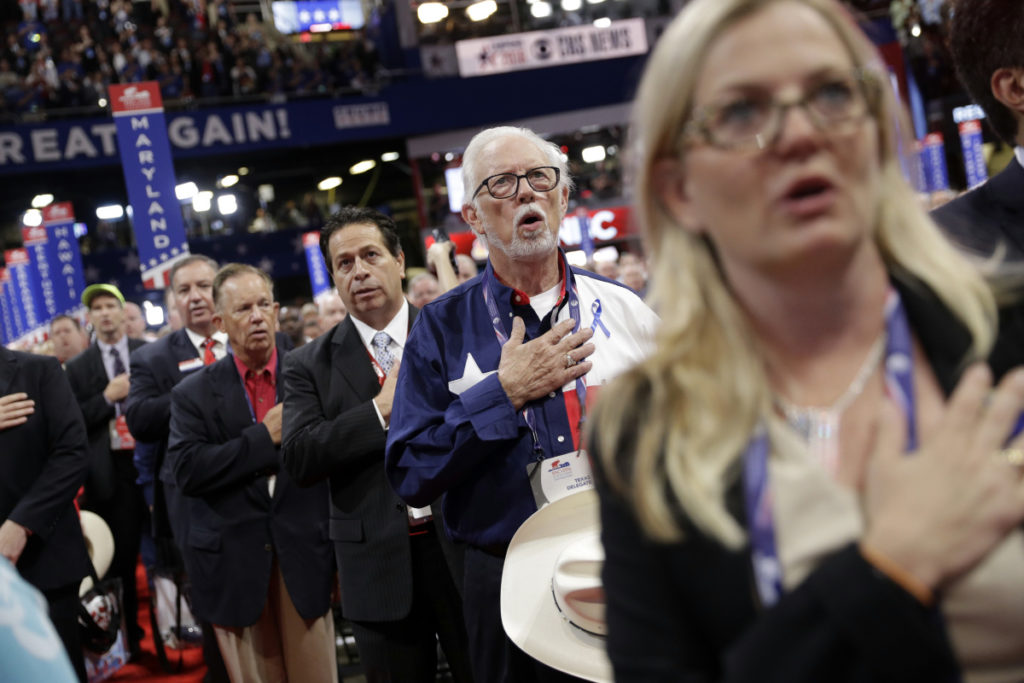
It’s official the Republican National Convention is officially Donald Trump‘s convention as he was formally nominated Republican candidate for President Tuesday night, putting an end to anti-Trump efforts on the Convention floor. Wednesday will be a day when the Trump campaign endeavors to unite the Party and move past the distractions of the first two days of the convention. Themed “Make America First Again,” expect no shortage of references to American exceptionalism. The convention program provides insight of what to expect from Wednesday’s lineup of speakers: America has always been an exceptional nation. Our Founding Fathers created a system of government that has protected our liberty, allowed American ingenuity to flourish, and lifted people out of poverty by creating the conditions for opportunity and prosperity. Unfortunately, years of bad policies and poor leadership have weakened our position in the world. Under a Trump administration, America will once again be a beacon of progress and opportunity. For many Americans, Wednesday night will be their first introduction to GOP VP candidate Mike Pence when he delivers the final speech of the evening. It’s been less than one week since Trump tapped him for the vice presidential nomination, and despite the fact he’s been Governor of Indiana the past four years and served six terms in the U.S. House of Representatives, he’s still a relatively unknown politician. Wednesday’s keynote speech is an opportunity to make his case to the nation and win over those Republicans who may be put off by Trump’s bombastic nature. The full list of Wednesday’s primetime speakers: Laura Ingraham: radio Host Phil Ruffin: businessman Pam Bondi: Attorney General of Florida Eileen Collins: Astronaut (retired) Michelle Van Etten: Small Business Owner Ralph Alvarado, Jr.: Kentucky State Senator Darrell Scott: Pastor Harold Hamm: Continental Resources Scott Walker: Wisconsin Governor Lynne Patton: the VP of the Eric Trump Foundation Marco Rubio: U.S. Senator from Florida Ted Cruz: U.S. Senator from Texas Eric Trump: Executive Vice President of The Trump Organization Newt & Callista Gingrich: former Speaker of the House and his wife Mike Pence: candidate for Vice President and Governor of Indiana
GOP nominates Donald Trump, now standard-bearer for party

Donald Trump has officially won the Republican Party’s presidential nomination, making the businessman the GOP standard-bearer after a rollicking primary season that saw him vanquish 16 rivals. The roll call vote of states on Tuesday gave Trump enough delegates at the Republican National Convention to win the nomination after months of speculation and dissent within the GOP ranks. There was little opposition on the floor as delegates cast votes for Trump state by state. On Wednesday, Vice Presidential nominee Mike Pence delivers a prime-time address along with Texas Sen. Ted Cruz, the primary runner-up who remains reluctant about endorsing Trump despite calls for party unity. So far, many of the speakers have devoted more time to denouncing presumptive Democratic nominee Hillary Clinton. She was talked about more than Trump himself on Tuesday night. House Speaker Paul Ryan said Clinton represents a third term of Barack Obama‘s presidency instead of the “clean break from a failed system.” Senate Majority Leader Mitch McConnell, R-Ky., said Clinton has “a tortured relationship to the truth.” Trump himself briefly appeared in a videotaped statement: “This is a movement, but we have to go all the way,” he said. What to know about the second day of the convention: — THE NOMINATION The boisterous roll call featured officials bragging about their states, per tradition, and enthusiastically declaring Trump the winner of their delegates. New York put him over the top in the delegate count, with Trump’s son Donald Jr. delivering that state’s results. Texas Sen. Ted Cruz’s name wasn’t formally placed in nomination even though he was closest to Trump in the primaries. Earlier Tuesday, some Republicans were saying Cruz’s supporters wanted to gather enough signatures to allow the Texan to be nominated. Being officially nominated means a candidate is entitled to have supporters deliver a nominating and seconding speech. But Trump’s campaign and GOP officials eager for a show of unity behind Trump worked to head that off. — THE SPEECHES New Jersey Gov. Chris Christie, a former federal prosecutor, laid out an aggressive case against Clinton, asking the crowd to weigh in on her leadership on the Islamic State group, China, and an al-Qaida-linked group in Nigeria. Riled up, the crowd yelled “Lock her up! Lock her up!” Failed Republican presidential candidate Ben Carson went so far as to associate Clinton with Lucifer. While politicians at the podium heaped criticism on Clinton, Trump’s children made direct appeals in favor of Trump. Tiffany Trump, the candidate’s 22-year-old daughter from his marriage to Marla Maples, said her father is a “natural-born encourager” who has motivated her to work her hardest. Donald Trump Jr., his eldest son and an executive vice president at The Trump Organization, cited his father’s business acumen and said his father approaches business projects the same way he has approached his campaign and life in general. Speakers also included some unknown names, such as Andy Wist, founder and CEO of a waterproofing company in the Bronx, as well as Dana White, president of the popular Ultimate Fighting Championship, which promotes mixed martial arts. — CLINTON WEIGHS IN Clinton said the first day of the Republican gathering had been “surreal,” comparing it to the classic fantasy film “Wizard of Oz.” “When you pull back the curtain, it was just Donald Trump with nothing to offer to the American people,” Clinton said during a speech in Las Vegas. After the roll call, Clinton tweeted a fundraising appeal: “Donald Trump just became the Republican nominee. Chip in now to make sure he never steps foot in the Oval Office.” She also tweeted, “If you think Chris Christie can lecture anyone on ethics, we have a bridge to sell you,” a reference to the George Washington Bridge scandal. — MONDAY NIGHT HANGOVER Trump’s wife, Melania, received criticism because her speech Monday included two passages with similarities to a speech first lady Michelle Obama delivered at the 2008 Democratic convention. Mrs. Trump’s speech was well received in the convention hall. Trump campaign chairman Paul Manafort called the criticism “just absurd” and said the issue had been “totally blown out of proportion.” — OUTSIDE THE HALL Police broke up scuffles between groups of demonstrators a few blocks from the Republican National Convention as crowds in the hundreds gathered Tuesday afternoon. There were no arrests, police said, despite several tense moments that saw officers step in between protesters pushing and shouting at each other during some of the biggest, most raucous gatherings in downtown Cleveland since the four-day convention began on Monday. One skirmish broke out when right-wing conspiracy theorist and radio show host Alex Jones started speaking in downtown’s Public Square through a bullhorn. Police on bicycles pushed back a surging crowd, and Jones was whisked away. — THE REST OF THE WEEK Vice presidential pick Mike Pence, the Indiana governor, is set to speak Wednesday. Cruz, who has not yet endorsed Trump, is set to speak too. Trump will close the convention with an acceptance speech Thursday night. Republished with permission of the Associated Press.
Here’s Alabama’s 50 delegates at the Republican National Convention
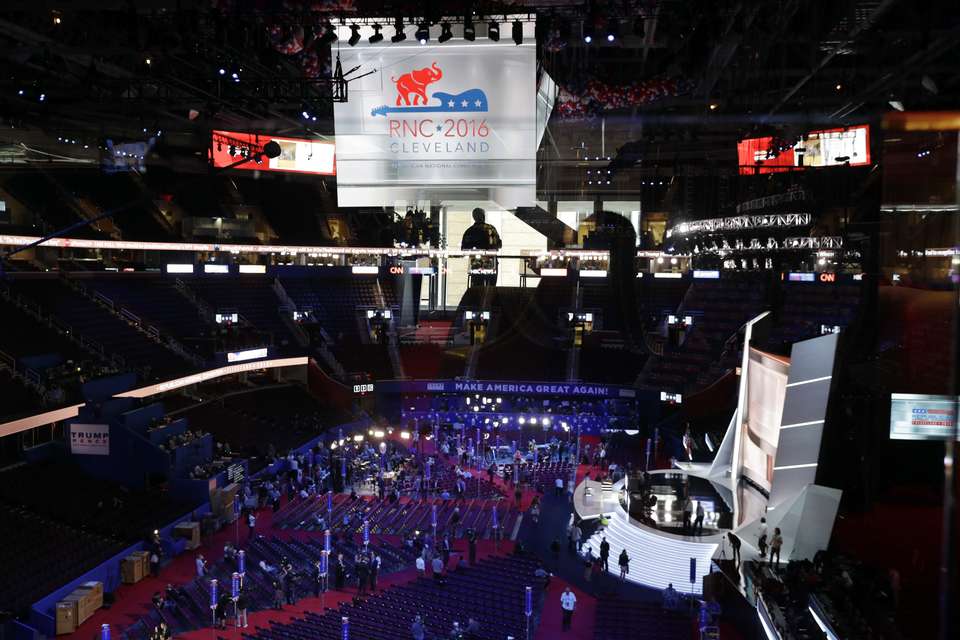
The Republican National Convention kicked off Monday in Cleveland, and 36 of Alabama’s delegates are bound to support Donald Trump as the presidential nominee on a first ballot. The delegates — 50 total from the Yellowhammer State — are a mix of party officials and elected officials as well as rank-and-file Republicans. The Republican National Convention runs July 18-21 and Trump is slated to be named the Republican nominee. In the wake of police violence across the nation, Alabama’s delegation will wear blue ribbons in support of law enforcement. Many delegates, as well as attendees from across the state, are hopeful Trump will address national unity in his Thursday night acceptance speech. Among those attending is Alabama Today Publisher and Vice President of the 60 Plus Foundation, Apryl Marie Fogel. “I believe the only message that’s going to resonate across the board for all Americans regardless of party is one of unity,” Fogel said to AL.com. “We have to face the troubles we come across as a nation together … be it the safety of law enforcement or Black Lives Matter protesters and supporters. Americans have to tackle these tough conventions together in a way that doesn’t alienate one another.” While not centerstage, Alabama’s delegates have a prime seating spot at the Convention, situated front and center directly to the left of the convention stage with an unobstructed view of the stage. Here’s the full list of Alabama’s Convention delegates: Trump At Large Place 1 Delegate: Jim Bonner Alternate Delegate: Terry L. Butts Place 2 Delegate: Jim Carns Alternate Delegate: J.T. “Jabo” Waggoner Place 3 Delegate: Judy Carns Alternate Delegate: Pat M. Wilson Place 4 Delegate: Ed Henry Alternate Delegate: Jim Wilson Place 5 Delegate: Shaun McCutcheon Alternate Delegate: Deanna K. Frankowski Place 6 Delegate: James Mathews Alternate Delegate: Sallie Bryant Place 7 Delegate: Bob Baccus Alternate Delegate: Will Sellers Place 8 Delegate: Perry O. Hooper Alternate Delegate: Rebecca L. Chambliss Place 9 Delegate: Will Mathews Alternate Delegate: Phyllis Davis Place 10 Delegate: Barry Moore Alternate Delegate: Jonathan O. Barbee Place 11 Delegate: Catherine Crosby Long Alternate Delegate: Trey Garner Place 12 Delegate: James Henderson Alternate Delegate: Britney Garner Place 13 Delegate: Chess Bedsole Alternate Delegate: Grady H. Thornton Place 14 Delegate: Dennis H. Beavers Alternate Delegate: Patsy W. Vines Place 15 Delegate: Bob Clayton Alternate Delegate: Taylor Means Place 16 Delegate: Laura E. Payne Alternate Delegate: Gina Dearborn Place 17 Delegate: W. Brent Woodall Alternate Delegate: Beth Clayton Place 18 Delegate: Frank H. Long, Jr. Alternate Delegate: Tom Davis Place 19 Delegate: Terry Lathan (No alternate delegate position available.) Place 20 Delegate: Paul Reynolds (No alternate delegate position available.) Cruz At Large Place 1 Delegate: Tom Parker Alternate Delegate: Alex Fox Place 2 Delegate: Bonnie Sachs Alternate Delegate: Judy Owens Motlow Place 3 Delegate: David Wilson Alternate Delegate: Joan Reynolds Place 4 Delegate: Tom Ford Alternate Delegate: Cheryl Mathews Place 5 Delegate: Chad Mathis Alternate Delegate: Sue Alexander Place 6 Delegate: Arnold Mooney Alternate Delegate: Cam Ward Place 7 Delegate: Carla S. King Alternate Delegate: Suzelle Josey Place 8 Delegate: David Pinkleton Alternate Delegate: Andrew Sorrell Place 9 Delegate: Vicki Drummond (No alternate delegate position available.) District 1 Trump 3 Place 1 Delegate: Frank Burt, Jr. Alternate Delegate: Jacquelyn “Jackie” Gay Place 2 Delegate: Jeff Sessions Alternate Delegate: Jerry Lathan Place 3 Delegate: Candace Cooksey Alternate Delegate: Stephanie K. Alexander District 2 Trump 2 Place 1 Delegate: Jeana Boggs Alternate Delegate: Alva M. Lambert Place 2 Delegate: Bill Rayborn Alternate Delegate: Lee Sellers Cruz 1 Place 1 Delegate: Mike Holmes Alternate Delegate: Darlene Hutchinson Biehl District 3 Trump 2 Place 1 Delegate: Charles Whatley Alternate Delegate: Tom Whatley Place 2 Delegate: Kathleen Moore Alternate Delegate: Joseph R. Fuller Cruz 1 Place 1 Delegate: Michael McCabe Alternate Delegate: Denise Bates District 4 Trump 3 Place 1 Delegate: Bradley L. Williams Alternate Delegate: J. Holland Place 2 Delegate: Mack N. Butler Alternate Delegate: Caroline Aderholt Place 3 Delegate: Tim Wadsworth Alternate Delegate: District 5 Trump 2 Place 1 Delegate: Jim Peters Alternate Delegate: Tom Fredricks Place 2 Delegate: Shannon Matthew Moore Alternate Delegate: Christopher Drensek Rubio 1 Place 1 Delegate: Dean Brandon Alternate Delegate: Matthew Sorrell District 6 Trump 2 Place 1 Delegate: Joe Freeman Alternate Delegate: Renee Gentle Powers Place 2 Delegate: Jef Freeman Alternate Delegate: Swaid N. Swaid Cruz 1 Place 1 Delegate: Colin Luke Alternate Delegate: Charles Knight District 7 Trump 2 Place 1 Delegate: Teresa I. Beeker Alternate Delegate: Margie George Place 2 Delegate: Chris Beeker III Alternate Delegate: Edmon H. McKinley Cruz 1 Place 1 Delegate: Ann C. Eubank Alternate Delegate: Jamey Clements
A lot of holes in GOP presidential ground game in key states
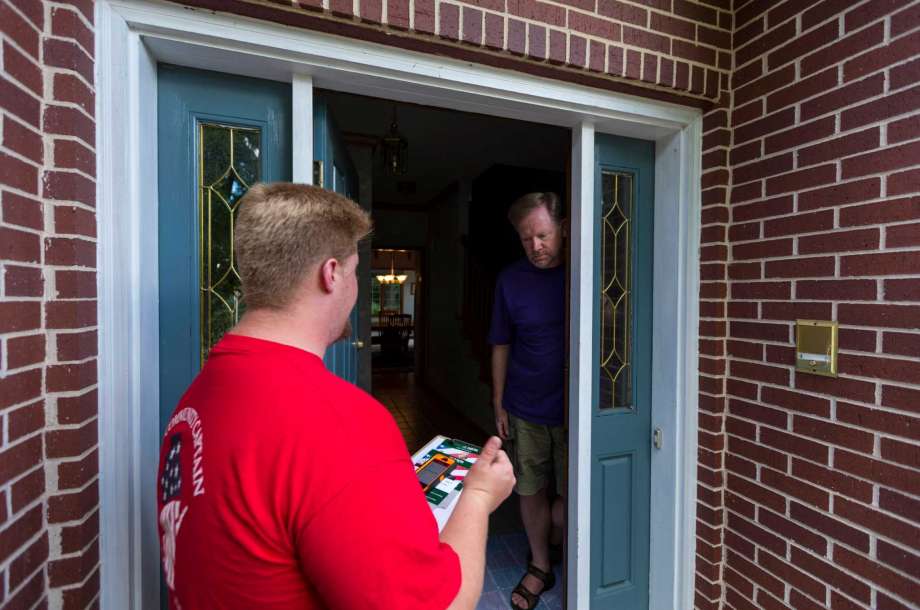
Presidential battleground states were supposed to be swarming with Republican Party workers by now. “We’ve moved on to thousands and thousands of employees,” party chairman Reince Priebus declared in March, contrasting that with the GOP’s late-blooming staffing four years earlier. “We are covering districts across this country in ways that we’ve never had before.” That hasn’t exactly happened, a state-by-state review conducted by The Associated Press has found. With early voting beginning in less than three months in some states, the review reveals that the national GOP has delivered only a fraction of the ground forces detailed in discussions with state leaders earlier in the year. And that is leaving anxious local officials waiting for reinforcements to keep pace with Democrat Hillary Clinton in the states that matter most in 2016. To be sure, the national party actually has notched record levels of fundraising over the past few years and put together a much more robust ground game than it had in 2012. But officials acknowledge the real competition isn’t their past results or the chronically cash-strapped Democratic Party. It’s Clinton and what GOP party chairman Reince Priebus calls “that machine” of Clinton fundraising. Some examples of Republican shortfalls: Ohio Republicans thought they were going to see 220 paid staffers by May; in reality, there are about 50. Plans for Pennsylvania called for 190 paid staffers; there are about 60. Iowa’s planned ground force of 66 by May actually numbers between 25 and 30. In Colorado, recent staff departures have left about two dozen employees, far short of the 80 that were to have been in place. AP learned of the specific May staffing aims from Republicans who were briefed earlier this year; the RNC did not dispute them. Current totals came from interviews with local GOP leaders over the past two weeks. The gulf between what state leaders thought they could count on and what they’ve actually got comes as RNC’s ground game is asked to do more than ever before. Presumptive nominee Donald Trump is relying on the party to do most of the nuts-and-bolts work of finding and persuading voters in the nation’s most competitive battlegrounds. “This is a race we should win,” Ohio GOP chairman Matt Borges said, citing a voter registration boom. “Now, we have to put the people in the field.” In New Hampshire, a swing state that also features one of the nation’s most competitive Senate contests, the Republican National Committee’s original plan called for more than 30 paid staff on the ground by May. Yet what’s happening there highlights that even when the RNC is close to meeting its staffing goals, there can be problems. In this case, 20 positions have been converted to part-time, and local officials have been struggling to fill them. “It’s a tall order to ask the RNC to be the complete field operation for the presidential nominee,” said Steve Duprey, a national party committeeman from New Hampshire. “We’re following through on the plan, but it was slower being implemented than we first would have hoped.” Borges and Duprey, like Republican leaders across the nation, acknowledged that the national party has dramatically reduced its staffing plans in recent months. “You discuss idealistic, you discuss realistic,” said the RNC’s political director Chris Carr. “Some people hear what they want to hear.” The Democrats have been more focused. The GOP’s foes, says party chairman Priebus, “have built their program around a candidate.” By that measure, Clinton and her Democratic allies appear to be quite far ahead, with roughly double the staff of the Republicans in Ohio, for example. For anyone – party or candidate – ground operations are expensive. The RNC’s 242-person payroll cost $1.1 million in May, federally-filed financial documents show. Additionally, the party transfers hundreds of thousands of dollars each month to state parties, which in turn hire more people. Between direct RNC employees and state employees hired with the help of transfers, the party counts more than 750 staff members, including 487 spread across the country and concentrated in battleground states. By contrast, at this point in 2012, there were just 170 paid Republican operatives across the country. Party officials say they are confident they will raise enough money to maintain – and very likely boost – the current level of employees until Election Day. Trump, who did not actively raise money during the primary season, touted surprisingly strong fundraising numbers in late May and June, including $25 million that will be shared with the party. But it was the primary triumph of Trump in May – and the fact that he did not bring with him a hefty portfolio of donors – that derailed the party’s fundraising and hiring goals, party officials said. The timing was important because a nominee typically serves as a major fundraiser for the national party, and having one in March or April would have given the Republicans a boost. A sign on an office door in Sarasota, Florida, illustrates how critical the RNC will be to Trump’s bid for the White House. It’s Trump’s state headquarters. “THANKS FOR STOPPING BY OUR OFFICE!” the blue paper reads. “Our office is TEMPORARILY CLOSED to the public, while our office works to prep for the National Convention in Cleveland.” A phone call to the number on the sign ended with an automated message stating, “Memory is full.” The Republican Party has 75 employees on the ground in Florida – a few dozen shy of Clinton – but they aren’t seamlessly integrated with the Trump campaign. “I do see cooperation between the national party and the Trump campaign,” said Michael Barnett, chairman of the Palm Beach County GOP. “But that hasn’t materialized at the local level yet. That doesn’t mean it won’t happen. It’s a little bit of a late start, but I’m not nervous. Not yet.” Like Florida, Ohio and New Hampshire, Wisconsin is a presidential battleground that features a highly competitive Senate race. That means national party staffers have the dual task


